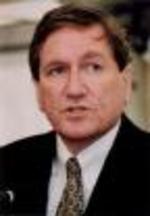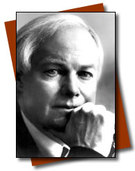As a jaded ex-officer of the US Mission to the UN, I found (in my live blogging of the speech, made at a conference held yesterday by Democracy Arsenal's sponsor, the Security and Peace Institute, can be found here) the comments made by Deputy UN Secretary General Mark Malloch Brown to be a bit blunt, a bit one-sided, but largely reflective of the attitude that the UN and most of its membership have toward the US these days, and thus not shocking in the least. His viewpoint, in some key respects, dovetailed with the critique that progressives make of this Administration's failure to use the UN effectively to advance American policy goals.
But to both the New York Times and, far more so, to US Amb to the UN John Bolton, the comments were far different: unprecedented in their harshness toward a UN member state. Here's what Bolton had to say on the matter today:
Ambassador John R. Bolton, U.S. Permanent Representative to the United Nations
Remarks at the Security Council Stakeout
New York City
June 7, 2006
REPORTER: Ambassador, could I get a few comments about, especially about Mr.
Brown's comments about my station?
AMBASSADOR BOLTON: Well, on that speech, this is a very, very grave mistake by
the Deputy Secretary General. We are in the process of an enormous effort to
achieve substantial reform at the United Nations. And it's a difficult effort,
but it's an effort that we feel very strongly about. And to have the Deputy
Secretary General criticize the United States in such a manner, can only do
grave harm to the United Nations. Even though the target of the speech was the
United States, the victim, I fear, will be the United Nations. And even worse
was the condescending and patronizing tone about the American people. That
fundamentally and very sadly, this was a criticism of the American people, not
the American government, by an international civil servant, it's just
illegitimate. So we've thought about this a good deal and we didn't respond to
it yesterday evening when we got a copy of the speech. But what we think the
only way at this point to mitigate the damage to the United Nations is that the
Secretary General Kofi Annan, we think has to personally and publicly repudiate
this speech at the earliest possible opportunity. Because otherwise I fear the
consequences, not just for the reform effort, but for the organization as a
whole. I spoke to the Secretary General this morning. I said I've known you
since 1989, and I'm telling you this is the worst mistake by a senior UN
official that I have seen in that entire time. That's why the only hope I think
is that the Secretary General comes to the rescue of the organization and
repudiates the speech.
REPORTER: Did you also call for Mr. Brown's resignation?
AMBASSADOR BOLTON: I've said what I have to say on that subject for now.
REPORTER: What do you mean, "come to the rescue? What could the United States
do next if he does not repudiate the speech?
AMBASSADOR BOLTON: I am concerned at this point at the very wounding effect
that this criticism of the United States will have in our efforts to achieve
reform. And this isn't the first time the Deputy Secretary General has done
this recently. He gave an interview a few weeks ago that criticized the United
States and the other major contributors. This is very serious. This is very
serious.
REPORTER: What was Mr. Annan's reaction to your suggestion that he repudiate
the speech?
AMBASSADOR BOLTON: I'll leave him to speak. Hopefully he would address this by
the noon briefing. If it's his opinion that he supports what the Deputy
Secretary General said, I hope it's not, but if it is then he should say so
forthrightly. My hope is that he looks at the potential adverse effect that
these intemperate remarks would have on the organization and repudiate it. I
think that would be the cleanest, safest thing for the organization.
REPORTER: What's the response been in Washington to this? Has there been any,
Capitol Hill and in the White House?
AMBASSADOR BOLTON: In the time since the speech was given I've heard a lot that
disturbs me and it's one reason that I called the Secretary General this
morning and believe that the only way to mitigate the damage is to repudiate
the speech.
REPORTER: To what extent to you take some of these comments personally in terms
of what he seems to be implying by the style you bring to this, or create
suspicion ?
AMBASSADOR BOLTON: I don't take any of it personally.
REPORTER: This could be interpreted by some in this institution as a US attempt
to silence its critics. How would you address that criticism?
AMBASSADOR BOLTON: The organization is an organization of member governments.
The Secretariat works for the member governments. So that when a member of the
Secretariat criticizes a member government, and as I said, criticizes the
intelligence of the people of a member government, that's a very questionable
activity. I think it's important to rescue the reform effort, to rescue the
institution that Secretary General needs to make it clear that these remarks
did not represent his opinion about the United States. Okay. Thank you very
much.
Annan refused Bolton's demand that he repudiate Malloch Brown's remarks. Here's what I make of the thing:
- It's true that Malloch Brown's comments may have been close to the line for an international civil servant, though I don't think there should be a ban on UN officials speaking difficult truths to Member States. Malloch Brown was not focused on insulting America or Americans, but on begging for more US engagement and involvement to make the UN work.
- Calling the remarks the "worst mistake by a senior UN official" since 1989 is an insult to the memory many thousands who died in Rwanda and Bosnia due to far more serious mistakes by UN officials.
- Bolton's fit of fury will likely only call attention to the substance of Malloch Brown's remarks (excerpted here) about how isolated and mistrusted the US now is at the UN, and how ineffective the Bush Administration's policies have been. UN-bashers will blame the messenger, but the American people are more sophisticated than that. They will understand readily how his message ties into the problems they are witnessing daily as a result of our unilateralist and misguided foreign policy.



















